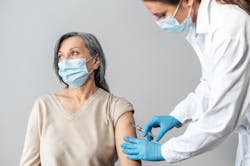COVID-19 boosters this fall? Most older adults are ready to roll up their sleeves
Within weeks, updated COVID-19 vaccines could become available across the United States, offering protection against new variants of coronavirus that are making hundreds of thousands of Americans sick, and killing nearly 400 of them, every day.
A new University of Michigan poll shows that 61% of people over 50 who have already gotten at least one dose of COVID-19 vaccine are very likely to roll up their sleeves this fall to get an updated booster shot.
That percentage might increase if healthcare providers specifically recommend the updated vaccine to their patients, the poll suggests.
The virus has had an especially lethal impact on people over 65, as well as on Black adults over 50 and people with low incomes. The poll finds that 68% of people in each of these groups who have had a COVID-19 vaccine in the past say they are very likely to get a COVID-19 booster this fall.
By comparison, a much lower percentage — 55% — of people age 50 to 64 with a past COVID-19 vaccine said they’re very likely to get a fall booster.
In addition to those who say they’re very likely to get a fall booster, about 1 in 5 adults over age 50 (21%) who had gotten vaccinated against COVID-19 in the past say they are somewhat likely to get a booster this fall.
But sizable percentages of some groups of previously vaccinated older adults said they won’t get a fall booster at all, including 23% of all adults age 50 to 64, and 22% of all white respondents over age 50.
Fall booster attitudes also vary depending on current vaccination status. While 24% of vaccinated-but-not-boosted older adults say they’re very likely to get a fall booster, the percentage was 56% among those who have gotten one booster and 88% of those who have gotten two boosters. Second boosters have been available to people over 50 since late March.
The poll was taken in late July for the National Poll on Healthy Aging, based at the U-M Institute for Healthcare Policy and Innovation. The poll is supported by AARP and Michigan Medicine.

